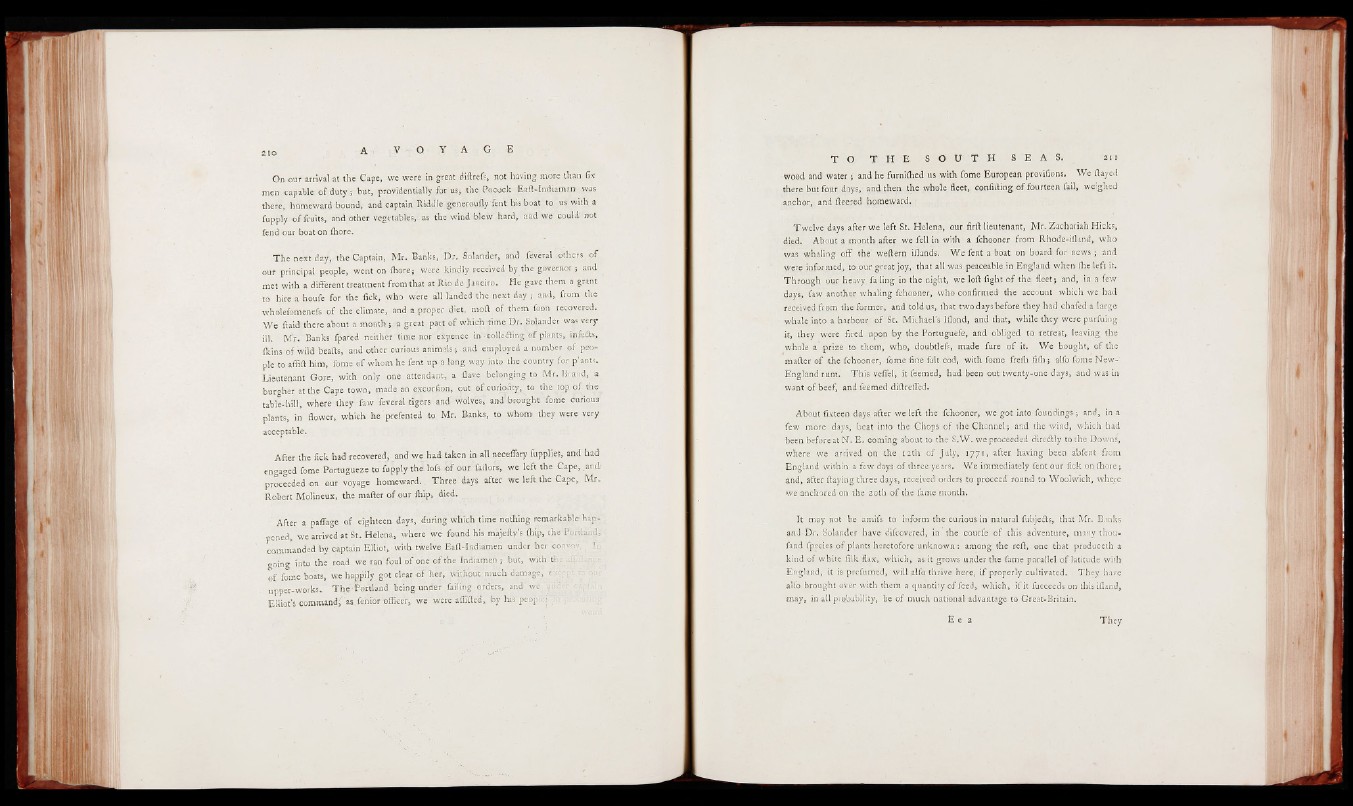
On our arrival at the Cape, we were in great diftrefs, not having more than fix
men capable of duty; but, providentially for us; the Pocock Eaft-Indiaman was
there, homeward bound, and captain Riddle generouily fent his boat to us with a
fupply of fruits, and other vegetables, as the wind blew hard, and we could not
fend our boat on ihore. ■
The next day, the Captain, Mr. Banks, Dr. Solander, and feveral others: of
our principal people, went on ihore; were kindly received by the governor; and
met with a different treatment from that at Rio de Janeiro. He gave them a grant
to hire a houfe for the fick, who were all landed the next day ; and, from the
wholefomenefs of the climate, and a proper diet, moft of them foon recovered.
We if aid there about a month; a great patt of which time Dr. Solander was very
ill. Mr. Banks fpared neither time nor expence in colledting of plants, infefis,
ikins of wild beads, and other curious animals ; and employed a number of people
to afflft him, feme of whom he fent up a long way into the country for p’ants.
Lieutenant Gore, with only one attendant, a flave belonging: to Mr. Brand, a
burgher at the Cape town, made an excurfion, put of curiofity, to the top of the^
table-hill, where they faw feveral tigers and wolves, and brought fome curious
plants, in flower, which he prefented to Mr. Banks, to whom they were very
acceptable.
After the lick had recovered, and we had taken in alt neceflary fupplies, and had
engaged fome Portuguese to fupply the- lofs of our failofs, we left the Cape, and
proceeded on our voyage homeward. Three days after we left the Cape,, Mr*
Robert Molineux, the matter of our ihip, died.
After a paflage of eighteen days, during which time nothing remarkable happened,,
we arrived at St. Helena, where we found his majefty’s ihip, the Portland;
commanded by captain Elliot, with twelve EaH-Indiamen under her conyo
going into the road we ran foul of one of the Indiamen ;• but, with the a
of fome boats, we happily got clear of her, without much damage, exce
upper-works. The Portland being under failing orders, and we a:
EUiot’s command» as;fenior officer* we were afli'fted, by his peopl e^r
wood and water ; and he furniihed us with fome European provifions. We ftayed
there but four days, and then the whole fleet, confiding of fourteen fail, weighed
anchor,; and fleered homeward.
Twelve days after we left St. Helena, our firft lieutenant, Mr. Zachariah Hicks,
died. About a month after we fell in with a fchooner from Rhode-ill and, who
was whaling off the weftern iilands. We fent a boat on board for news ; and
Were informed, to,our great joy, that all was peaceable in England when ihe left it.
Through bur heavy, fading in the night, we loft fight of the fleet j and, in a few
days, faw another whaling fchooner, who confirmed the account which we had
received from the former, and told us, that two days before they had chafed a large
whale into a harbour of' St. Michael’s Ifland, and that, while they were purfuing
it, they were fired upon by the Portuguefe, and obliged to retreat, leaving the
whale a prize to them, who, doubtlefs, made fure of it. We bought, of the
matter of the fchooner, fome fine fait cod, with fome freih fifh j alfo fome New-
England rum. This vefiel, it feemed, had been out twenty-one days, and was in
want of beef, and feemed diftrefled.
About fixteen days after we left the fchooner, we got into foundings-; and, in a
few more days, beat into the Chops of the Channel j and the wind, which had
been before at N. E. coming about to the S. W. we proceeded diredtly to the Downs,
where we arrived on the 12th of July, 1771, after having been abfent from
England within a few days of three years. We immediately fent our fick on ihore;
and, after flaying three days, received orders to proceecf round to Woolwich, where
we anchored on the 20th of the fame month.
It may not be amifs to inform the curious in natural fubjedts, that Mr. Banks
and Dr. Solander have difcovered, in the courfe of this adventure, many thou-
fand fpecies of plants heretofore unknown: among the reft, one that produceth a
kind of white filk flax, which, as it grows under the fame parallel of latitude with
England, it is prefumed, will alfo thrive here, if properly cultivated. They have
alfo brought over with them a quantity of feed, which, if it fucceeds on this ifland,
may, in all probability, be of much national advantage to Great-Britain.
E e 2 They